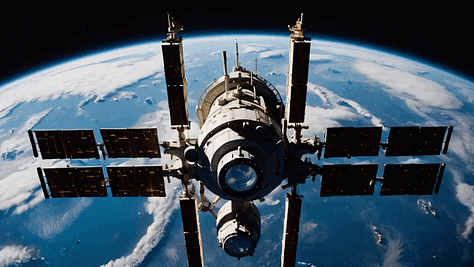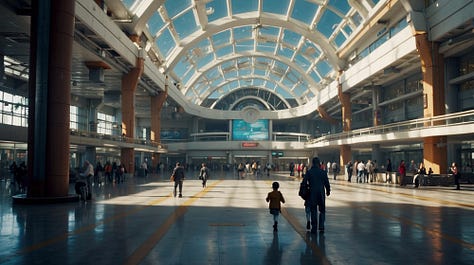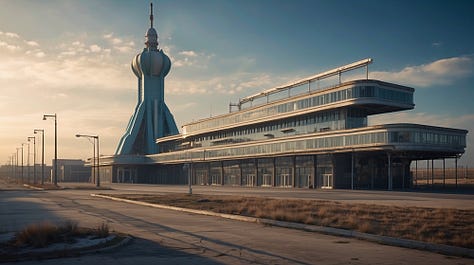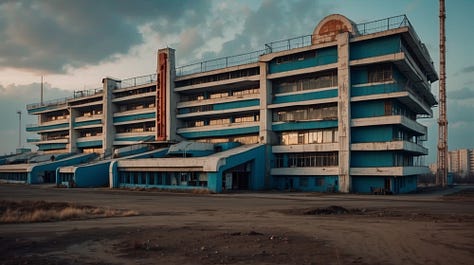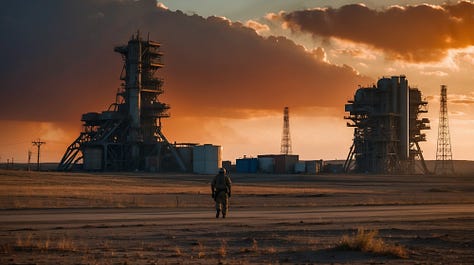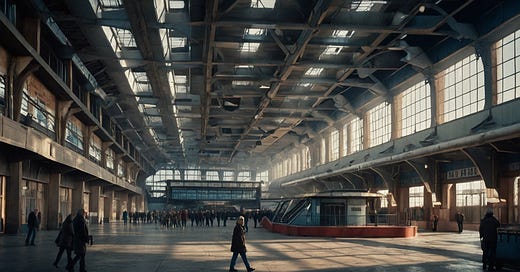In the shadowed expanse of Baikonur Cosmodrome, where ambition and history blend beneath the vast canvas of the Kazakh steppe, Major Alexei Sokolov and his elite Shadow Watch team stood on the brink of an operation that transcended earthly politics. Their mission stretched into the uncharted territories of space, a realm where physics commands over human desires. Under the guidance of Pyotr, a figure whose soul seemed interwoven with the cosmodrome's legacy, they ventured into a journey wrapped in layers of secrecy.
The secluded compound within Baikonur, emblematic of Soviet space aspirations, became their covert base. Against the backdrop of towering launch structures reaching for the skies, Shadow Watch delved into the cosmodrome's hidden depths. A network of underground facilities sprawled beneath them, echoing the Soviet Union's relentless chase for cosmic supremacy.
Descending into the earth, the air thickened with anticipation, reverberating with the echoes of past glories and sorrows. The dim corridors, sporadically lit by flickering lights, thrummed with the pulse of hidden technologies. In this subterranean heart, they were inducted into the arcane realms of space exploration.
This initiation was transformative. Pyotr, his voice carrying the weight of celestial movements, unveiled the complex ballet of orbital mechanics and the fragile interplay of thrust and gravity. He shared the stark realities of microgravity—its toll on the human body, the relentless pull of the void.
Awed by the vastness of space, the team faced the enormity of their challenge. Pyotr's lessons extended beyond the physical, touching the philosophical. He reflected on humanity's place in the cosmos, our petty conflicts dwarfed by the infinite. Yet, he argued, our quest for understanding is what defines us.
Sokolov, hardened by terrestrial conflicts, found a deeper connection in Pyotr's words. The forthcoming trials were existential. Baikonur was not just a launch site but a gateway to a future where humanity's destiny was interlaced with the stars.
As they prepared, understanding dawned that their journey was not merely a test of skill but of spirit. The dangers were manifold, but their resolve was unwavering. They sought not just new horizons but answers to ancient questions that have long stirred the human soul.
In the silence of the steppe, under the cosmos's gaze, they stood ready, with Pyotr's wisdom and Baikonur's legacy as their beacon. They embarked on humanity's greatest adventure, stepping beyond Earth to confront the cosmos's mysteries.
Each team member, chosen for their expertise and resolve, was well-versed in combat and stealth. Yet, facing the vastness of space posed a fundamentally different challenge—a battle against the elements themselves.
Major Alexei Sokolov and his team underwent a profound transformation at Baikonur under Pyotr's guidance. Assuming the roles of engineers and scientists, they melded into the cosmodrome's community, their disguises acting as shields against detection.
They witnessed the Soviet space program's grand ambitions, feeling the tremors of impending launches and the solemnity of the launch pads. Amidst this hive of activity, they were reminded that the dream of space transcends earthly bounds.
Baikonur, a cathedral of human aspiration, was the stage for their dual roles in science and espionage. Pyotr revealed the cosmodrome's dual mission—frontiers of exploration masking a chess game of espionage and strategy.
They were introduced to cutting-edge technology—propulsion systems for celestial navigation, life support for the void, and communication arrays for contact with Earth. Each innovation was a testament to human ingenuity, a beacon of hope.
In the shadowed expanse of Baikonur Cosmodrome, where history and ambition intertwine beneath the vast Kazakh sky, Major Alexei Sokolov and his elite team, Shadow Watch, found themselves at the heart of a clandestine operation that transcended earthly politics, reaching into the unexplored realms of space. Under the guidance of Pyotr, a seasoned veteran whose life had been deeply intertwined with the cosmodrome's legacy, they navigated a complex web of secrecy enveloping their mission.
The secluded compound within Baikonur, became their operations hub. Amid the colossal structures that reached towards the heavens, Pyotr revealed the hidden depths of the cosmodrome—a network of underground facilities pulsing with the lifeblood of unseen technologies. Here, in the dimly lit corridors, Sokolov and his team were inducted into the mysteries of cosmic exploration, their initiation marking the beginning of a journey fraught with peril and shrouded in mystery.
Under the cloak of twilight that draped the Baikonur Cosmodrome, where history whispered secrets of the cosmos, Major Alexei Sokolov and his covert team, Shadow Watch, navigated the intricate web of their clandestine mission. Guided by Pyotr, a figure whose life was as interwoven with the cosmodrome's legacy as the stars are with the night, they embarked on a journey not just through the physical confines of Baikonur but into the depths of intrigue that veiled their purpose.
The silence in the makeshift command center at Baikonur was shattered by the sharp ring of the secure telephone line—a sound that never heralded good news. Major Alexei Sokolov, leader of Shadow Watch, hesitated for a moment, his instincts on high alert. The call was from their deep-cover informant within the FSB, a connection that had taken years to establish and even longer to trust. The voice on the other end was terse, the fear palpable even through the encrypted connection. "The nest has been struck," it said, using their coded language for an emergency compromising their operations. "Two of the flock have fallen." The line went dead before Sokolov could demand more details.
The room felt colder, the weight of the moment settling on everyone present. Shadow Watch had lost members before, but the fall of their Moscow headquarters was a blow that cut deep. Sokolov looked around at his team, their faces a mix of shock and resolve. They understood the unspoken truth: their identities were potentially compromised, and the safety of their network, a spiderweb of contacts and safe houses spread across the globe, was now in jeopardy.
The team sprang into action, each member taking on their pre-assigned roles in the event of such a catastrophe. Communications gear was wiped, hard drives encrypted then destroyed, and every trace of their presence began to be erased. But as they worked to secure their immediate environment, Sokolov's thoughts were with the two fallen comrades—agents who had dedicated their lives to the shadow war against enemies seen and unseen.
Their sacrifice would not be in vain, Sokolov vowed silently. Shadow Watch would adapt, evolve, and continue their mission. The loss of their Moscow base was a strategic hit, but it was also a clarion call to redouble their efforts. In the world of espionage and covert operations, the line between predator and prey was thin. Tonight, Shadow Watch had been reminded of their own vulnerability. Tomorrow, they would remind their enemies of Shadow Watch's lethal prowess.
The sprawling complex of Baikonur, a monument to Soviet cosmic ambition, became their stage. Here, amidst the giants of steel and flame that reached for the heavens, Pyotr, with his profound knowledge of the cosmodrome's labyrinthine heart, steered them through the shadows. They donned the mantle of engineers and scientists, merging with the pulse of the place, indistinguishable from the throngs whose dreams fueled the march towards the stars.
The enormity of the Soviet space endeavor enveloped them, each launch pad a testament to humanity's boundless aspiration, each rocket a harbinger of dreams unbound. Baikonur stood as a cathedral of human yearning, its spires not of stone but of metal and fire, each launch a prayer into the void.
Yet, beneath the surface of exploration and triumph lay a network of espionage and strategic machinations, a chessboard where satellites and spacecraft were the pieces in a grand geopolitical game. Pyotr unveiled to Sokolov and his team the dual nature of Baikonur's purpose. The civilian facade of space exploration masked the covert operations and military strategies playing out in the hidden corridors and secret chambers of the cosmodrome.
The civilian terminal, an architectural marvel that promised a future where the cosmos was within reach, served as a front for the intricate ballet of espionage. Hidden compartments and secret passageways facilitated the silent dance of spies and secrets, the lifeblood of their mission running through the veins of Baikonur.
In this domain of dualities, where each launch whispered of unseen wars and the promise of new horizons, Sokolov and his team operated in the penumbra. Their mission, entwined with the destinies of nations, became a race against time and an unseen adversary, shadows cast against the backdrop of humanity's leap into the cosmos.
Yet, it was beneath the star-strewn skies of the Kazakh steppe that they found moments of reflection. The cosmos, with its ancient light, reminded them of the vastness of their undertaking and the existential quest that propelled humanity into the void. What sought they among the stars? Was it knowledge, power, or perhaps something more profound?
As days blurred into nights under the watchful gaze of the cosmos, the bond between Sokolov, his team, and Pyotr deepened. They were no longer mere pawns in a geopolitical game but explorers on the cusp of the unknown, guardians of secrets that bore the weight of history and the promise of tomorrow.
Beneath the steely gaze of Baikonur's leviathan constructs, Major Alexei Sokolov and the Shadow Watch, cloaked in the guise of normalcy, prepared to delve into a world where the whispers of yesteryears intertwined with the silent promises of tomorrow. Guided by Pyotr's seasoned hand, a figure whose soul was as much a part of the cosmodrome as the very rockets it launched, they found themselves on the precipice of a journey not just through space but through the intricate dance of espionage that shrouded their every move.
Baikonur emerged as a crucible of Soviet ambition, its towering sentinels standing as silent testaments to a dream that transcended the confines of Earth. Under Pyotr's watchful eye, Sokolov and his ensemble adopted the identities of engineers and scientists, blending into the tapestry of Baikonur's daily rhythm. Their assimilation was seamless, their roles a shield against the scrutiny that might unveil their true quest.
As they traversed the cosmodrome's vast expanses, the scale of the Soviet space endeavor unveiled itself. Each launch pad, a colossus against the horizon, spoke of aspirations that soared beyond the terrestrial, every rocket whispering tales of dreams cast into the cosmos. Baikonur stood as a cathedral to human ambition, its every launch a litany of hope and defiance against the void.
Yet, beneath the surface of these celestial aspirations lay a web of intrigue as vast as the cosmos it sought to conquer. Pyotr, serving both as mentor and guide, peeled back the layers of Baikonur's dual purpose. The cosmodrome, a symbol of exploration, masked a deeper, more covert game of military strategy and espionage. The civilian facade, represented by the architectural marvel of the terminal, belied the intricate labyrinth of hidden compartments and secret passages that facilitated the silent war waged in the shadows.
In this realm of duality, where each launch served as a cover for the silent ballet of spy satellites and experimental weaponry, Sokolov and his team navigated the precipice between visibility and obscurity. Their mission, intertwined with the destiny of nations, became a race against both time and an unseen adversary, whose motives were shrouded in the darkness of space itself.
Yet, it was within the solitude of the Kazakh steppe, under the infinite expanse of the night sky, that moments of reflection found them. The stars, ancient harbingers of navigation and wonder, served as a reminder of the vastness of their undertaking. Here, on the edge of humanity's reach, they grappled with the existential queries that had propelled mankind into the void: What quest drove them among the stars? Was it knowledge, power, or perhaps something far more profound?
As days melded into nights, the bond between Sokolov, his team, and Pyotr deepened, transcending their roles in the geopolitical chess game to become explorers on the threshold of the unknown, guardians of secrets that bore the potential to reshape human history. Their mission at Baikonur, cloaked in secrecy and fraught with peril, stood as a testament to humanity's unquenchable thirst for discovery, a journey not merely of exploration but of revelation.
In the shadow of Baikonur's monolithic guardians, Major Alexei Sokolov and the Shadow Watch, with Pyotr's wisdom lighting their path and the legacy of the cosmodrome fueling their spirits, faced the horizon. Before them lay the unfathomable mysteries of space, waiting to be unveiled. Here, in this crucible where human ambition met the intrigue of unseen wars, they would carve their path—a journey marked not just by the quest for knowledge but by the pursuit of truth in the vast, star-strewn tapestry of the cosmos.
Ivan broke the silence. His voice, rough as the terrain of distant planets, spoke of dreams that had soared high only to be ensnared in the terrestrial webs of power and intrigue. "We reached for the stars," he reflected, a note of pride battling with the specter of loss in his eyes, "only to see our aspirations entangled in the games of those who view the cosmos as just another battlefield."
Natalia, whose life had once been governed by the purity of mathematics, traced the equations before her—a remnant of a time when the universe seemed ordered and comprehensible. "In the elegance of the cosmos, I sought refuge," she whispered, her voice a testament to the journey from the clarity of numbers to the shadows of espionage, "only to find myself caught in a labyrinth that stretches from the heart of the Kremlin to the endless expanse above us."
The room grew heavy with their shared histories as Alexei, their stoic leader, articulated the essence of their struggle. "We balance on the edge," he declared, his steady gaze embodying the resolve that had brought them here, "between the phantoms of what was and the unknown frontiers that await us as battlegrounds among the stars."
As they delved into discussions of the geopolitical chessboard that had become their arena, the air between them crackled with a palpable sense of unity and purpose. They recounted the audacity of Soviet ambitions, the taut suspense bridging East and West, and the personal sacrifices that had defined their paths to this moment of clandestine defiance.
Outside, the expanse of the Cosmodrome lay silent under the cosmos, oblivious to the dreams and fears of those who dared to defy its legacy. Within their hidden sanctum, Shadow Watch's spirits were buoyed by the tales of endurance and rebellion—a chorus of defiance against the backdrop.
In this enclave, where secrets and shadows intertwined, they found not just sanctuary but a shared identity, bound by the tapestry of their collective experiences. It was here, in the depth of night, that their individual stories wove together a narrative of resilience, a beacon of hope in the chill of conflict.
As the shadows lengthened, their conversation turned to the ominous signs that had begun to manifest around them. Elena's observation of the lights and patterns beyond their walls, Ivan's notice of altered patrols, and Mikhail's grim realization of Mordu's agents drew a chilling portrait of encroachment and danger.
Their sanctuary, once a fortress of hope, now seemed a fragile haven against the advancing shadow. The air grew thick with the weight of their realization, a silent acknowledgment of the precipice upon which they now stood.
The night air was ruptured by the cacophony of gunfire and explosions, a stark contrast to the deceptive peace that had settled over the compound adjacent to Shadow Watch's hideout. Within moments, the quiet of the night was shattered, replaced by the chaos of a battlefield. Agents of Mordu, cloaked in the anonymity of the dark, launched a surprise assault, their movements precise, a deadly dance of shadows and death. The compound, unsuspecting and unprepared, became a storm of violence and fear.
The attackers left their signature amidst the chaos: scorch marks etched into the floor, a menacing testament to their presence and a grim reminder of their intent. These marks, known only to those who had encountered Mordu's wrath, signaled a message of power and retribution. The battle, though brief, was intense, a maelstrom of bullets and bloodshed that ended as quickly as it began.
In the aftermath, the silence that followed was a somber echo of the violence. The air was thick with the smell of gunpowder and the stark realization of vulnerability. Amidst the wreckage, the agents of Shadow Watch, untouched but shaken, understood the proximity of the danger. Mordu's message was clear: no place was safe, and the shadows they fought against were closer than ever.
Alexei's voice cut through the tension, a clarion call to readiness and resolve. "The time for mere vigilance has passed," he announced, a determined edge to his words. "Mordu has made their move, and so shall we. We escalate, we prepare, we act."
In the clandestine quarters of Shadow Watch, beneath the relentless gaze of Baikonur's cosmos-bound ambitions, Major Alexei Sokolov convened his elite cadre. The air was thick with an unspoken tension, an electric anticipation that charged the dimly lit room with an urgency bordering on desperation. Amidst the hum of advanced technology and the cryptic dance of shadowy figures, Sokolov, a silhouette carved from the very darkness they sought to vanquish, unfolded the grave news that had cast a pall over their mission.
"Comrades," Sokolov's voice, a low rumble of contained fury and resolve, broke the silence, "our rendezvous with destiny has been compromised. The very foundation upon which we stand is under siege."
His words, measured yet laden with an ominous weight, reverberated through the hearts of his team. The revelation that the General Secretary might be ensnared in the web of Mordu's machinations sent a chill down their spines. It was a betrayal that cut deeper than the cold steel of an enemy's blade—a shadow cast upon the very soul of their cause.
The room, a bastion of secrets and strategy, seemed to contract around them, the walls inching closer as the magnitude of Sokolov's disclosure settled in. Here, in the sanctum of their operations, surrounded by the pulsing lifeblood of their surveillance and intelligence apparatus, the stark reality of their predicament became clear.
"We stand at the precipice of oblivion," Sokolov continued, his gaze sweeping across the assembly of Moscow's most formidable unseen warriors. "Our adversary is not just at our gates but within our walls, a specter more formidable than any we have faced."
In the charged atmosphere, a silent pact was forged, an unspoken vow of defiance and resilience. Each member of Shadow Watch, their faces masks of stoic resolve, recognized the Herculean task that lay ahead. The world, teetering on the brink of an abyss, looked to them as the final bulwark against the encroaching darkness.
As they rallied around Sokolov, their spirits intertwined in a bond forged in the crucible of countless trials, they prepared to delve into the heart of the maelstrom. With the fate of humanity hanging in the balance, they stood united, a phalanx of shadow warriors ready to confront the void.
Under the shroud of night at the Baikonur Cosmodrome, a palpable sense of anticipation mingled with the acrid tang of rocket propellant. The Shadow Watch, now veiled as unremarkable settlers, merged with the throng, absorbing the vibrant tapestry of humanity gathered. This diverse crowd—scientists, engineers, and families—was united by a singular blend of hope and trepidation, all drawn to the lunar dream.
Among the would-be colonists, conversations ebbed and flowed with a nervous energy. A young family whispered eagerly about a future domicile on the moon, picturing an Earthrise from their front porch, while engineers engaged in spirited discussions about the feasibility of lunar habitats, their talk peppered with technical lingo and hopeful conjectures.
As the clock ticked down to launch, spontaneous gatherings of people shared their dreams and fears, painting a vivid picture of human aspiration and anxiety. Tales of lunar exploits comforted children, and seasoned professionals weighed the intricacies of creating a sustainable outpost on the barren lunar landscape.
"A new dawn awaits us," a young scientist remarked, eyes alight with the reflection of the looming rocket. "Not just for us, but for all humankind."
Her companion, a grizzled engineer with a face marked by years of challenges, replied, "Imagine the problems we'll solve, the frontiers we'll conquer. Establishing a foothold on the moon is the ultimate testament to our ingenuity."
Families clung to each other, finding solace in shared visions of a serene existence far from Earth's conflicts. "Our children will know the moon as their home," a mother said softly, her gaze locked on the rocket that symbolized both their departure and their hopes.
At the bustling launch site, the air crackled with a mix of excitement and apprehension. The Shadow Watch members, shrouded in their assumed identities, proceeded with deliberate steps, every move and glance carefully calibrated to conceal their true mission. With the threat of discovery looming like a specter, each security checkpoint felt like a gauntlet, their forged credentials scrutinized with unnerving intensity.
"Just keep moving," one murmured, a silent pep talk amid the tension.
In the dim light of the pre-dawn, the settlers gathered at the base of the towering UR-900 rocket, its silhouette a monolithic specter against the slowly brightening sky. The air was thick with anticipation and the cold bite of fear, as whispers of Mordu's spies wove through the crowd like a chilling breeze. The transport spacecraft, perched atop the rocket, was a relic of the Soviet space age: functional, unadorned, and designed with a spartan efficiency that left no room for comfort. It was a vessel of survival, not luxury.
The process of boarding was meticulous and methodical, each settler passing through a series of checks under the watchful eyes of security personnel. Their expressions were stern, their movements precise, betraying no emotion—a stark reminder of the gravity of their mission. The settlers, a hundred in total, moved in a somber procession, their steps echoing on the metal gangways as they ascended into the spacecraft's cramped interior. The air inside was stale, tinged with the scent of metal and the faint, acrid odor of rocket fuel. Space was at a premium, with every inch meticulously allocated to maximize the payload. Seats were bolted to the walls, foldable and austere, surrounded by cargo straps and storage compartments crammed with supplies for their lunar settlement.
The expedition leader, a figure of quiet authority, moved among them, offering words of encouragement, their voice barely audible over the hum of the spacecraft's systems coming to life. "Remember why we're here," they murmured, locking eyes with each settler in turn, a silent vow that they would protect them from the unseen threat of Mordu's spies. The tension was palpable, a tangible entity that seemed to compress the very air they breathed.
As the final checks were completed, the settlers strapped themselves in, the cold metal of the buckles a stark reminder of the vast, indifferent expanse of space that awaited them. The spacecraft's interior dimmed, red warning lights casting eerie shadows across the faces of the passengers. A hushed silence fell, punctuated only by the occasional shuffle of movement or a stifled cough.
Then, with a sudden, violent lurch, the engines ignited, sending a shockwave of sound and vibration through the spacecraft. The settlers were pressed into their seats, the force of the launch a crushing weight upon their chests. Outside, the Earth receded at an alarming rate, the blue and green of its surface blurring into a distant orb framed by the black void of space. It was a moment of profound isolation and vulnerability, a stark reminder of the fragile line between life and death in the unforgiving vacuum of space.
As the spacecraft accelerated, the roar of the engines was a constant, thunderous presence, a physical force that seemed to penetrate to the very marrow of their bones. The settlers exchanged glances, their faces pale and drawn, each lost in their own thoughts. The leader watched them, their gaze lingering on the viewport as Earth faded from view. "We're far from safe," they whispered to no one in particular, their voice barely audible over the din. "But we're on our way."
The journey had begun, not just a physical voyage to the moon, but a flight from the shadows that pursued them. In the cold, silent expanse of space, aboard a Soviet-era transport, the settlers faced an uncertain future, haunted by the specter of Mordu. Yet, in the shared experience of that harrowing ascent, a bond was forged, a collective resolve to face whatever challenges awaited them on the lunar surface and beyond.
As the last tendrils of Earth's atmosphere slipped away into the cosmic void, the gravity of their mission enveloped the Shadow Watch team like the cold embrace of space itself. They were adrift in the vast, uncharted expanse, carrying the fragile seeds of a new beginning, all the while shadowed by the omnipresent specter of Mordu. This odyssey was their crucible, a harrowing flight not just from an adversary but toward a rendezvous with destiny on the barren shores of the moon.
The interior of their Soviet-era lunar transport was a study in austerity, its utilitarian design a stark reminder of the world they had left behind. The cabin, compact and unadorned, buzzed with the soft, persistent hum of life support systems, its sparse illumination casting ghostly shadows across the solemn faces of the crew. In this cloistered sanctuary, hurtling through the void, the members of Shadow Watch were islands of contemplation amid the sea of stars.
Alexei, the mastermind behind their tactical maneuvers, was the first to pierce the silence that had enveloped them. "In abandoning our home, we've cast our lot with the cosmos," he mused, his gaze fixed on the receding blue marble that was Earth. "It is on this celestial frontier where we'll carve out our bastion against tyranny."
Mara, whose prowess at evading the digital snares of Mordu had saved them more than once, nodded in agreement. "Though Earth fades from our view, its essence drives us onward. We carry the dreams of those we've left behind, pledging to shield them from the darkness at every turn."
The air, once heavy with apprehension, began to thrum with a collective sense of determination. They understood the enormity of their task: not merely to evade Mordu's grasp but to stand as the vanguard of freedom against his onslaught.
"Our strength lies not in our weapons, but in our unity," Ivan declared, his words cutting through the gloom with the force of conviction. "Mordu thrives on division and fear. United, we are his antithesis."
Embarking on the voyage to the moon aboard a Soviet civilian transport spacecraft was like stepping back into an era where austerity and utility were paramount. The vessel, a product of the late 1980s space race, was the epitome of Soviet engineering: functional, robust, and devoid of any luxury. This three-day journey was not just a trip; it was a transition into a realm where Earth's laws were replaced by the unforgiving physics of space.
The cabin's stark interior was a constant reminder of the mission's serious nature. The air was filled with a mix of mechanical hums and the soft murmur of the life support systems, creating a soundscape that was both reassuring and relentless. The crew, a collection of individuals united by a common purpose, found themselves cocooned within the vessel's metal confines, their lives momentarily reduced to the simple routines of existence in microgravity.
Eating in space was a ritual stripped of Earthly pleasures. Meals were utilitarian, designed for nutrition rather than enjoyment, consumed with a focus that bordered on meditation. Each bite was a reminder of the distance from home, the flavors a faint echo of a world left behind. Sleep, when it came, was fitful. The absence of a natural day-night cycle turned rest into a series of brief interludes, the body's rhythms disrupted by the perpetual twilight of space.
The crew's interactions were marked by a camaraderie born of necessity. Conversations, when they occurred, were a mix of technical discussions about the mission and reflections on the strangeness of their situation. There was a sense of being part of something much larger than themselves, a feeling underscored by the occasional glimpse of Earth through the small portholes, a distant blue orb receding into the blackness.
In the twilight of the 1980s, amidst the Cold War's silent but fierce battleground of technological supremacy, the Soviet Union's bare-bones approach to space exploration was about to undertake a mission of paramount secrecy and importance. The destination: the moon, an orb that had become not just a symbol of human curiosity, but a potential strategic vantage point. The vessel for this journey was a civilian transport spacecraft, embodying the robust simplicity of Soviet engineering, designed for efficiency and resilience over comfort.
The spacecraft, a relic of late Soviet space age technology, was a marvel of pragmatism. Its interior was utilitarian, the essence of space within confined to the bare necessities required for survival and operation. The crew compartment, bathed in the sterile glow of instrument panels, felt more like a submarine's control room than the bridge of a futuristic starship. Here, every square inch was accounted for, every system and control meticulously designed to maximize reliability and function under the harshest conditions imaginable.
As the spacecraft embarked on its three-day voyage to the moon, the crew settled into a routine dictated by the relentless march of time and the unyielding laws of physics. Meals were a ritual of necessity, each packet of food engineered for maximum nutrition and ease of consumption in the zero-gravity environment. The act of eating, stripped of earthly pleasures, became a solemn reminder of their isolation from the world they had left behind.
Sleep was intermittent, the human body's circadian rhythms disrupted by the absence of natural light and the ever-present hum of life support systems. Rest came in brief interludes, the crew cocooned in their acceleration couches, strapped in against the possibility of sudden maneuvers or the jolts of cosmic turbulence.
The process of landing on the moon was a delicate ballet of technology and human skill. The spacecraft's descent module, designed for the unforgiving lunar environment, engaged its engines to slow its approach, the burn calculated to perfection to enter lunar orbit. As they descended towards the surface, the barren, cratered landscape of the moon loomed large in the viewport, a silent witness to the celestial dance of arrival.
The final descent was a masterclass in precision engineering. The landing module's thrusters fired in short, controlled bursts, adjusting its trajectory and speed. The lunar surface approached, a vast expanse of shadows and light, until with a gentle jolt, they touched down, the spacecraft's landing struts compressing under the weight.
The moment the captain's voice, tinged with a blend of relief and awe, breaks the silence—"We are on the moon"—a palpable shift pervades the spacecraft's atmosphere. This utterance, simple yet profound, marks the culmination of not just days but decades of relentless pursuit, a journey not only through the vastness of space but through the very essence of human determination and spirit.
Within the confines of their austere spacecraft, a testament to the unadorned pragmatism of Soviet design, the crew—seasoned veterans of the cosmos's merciless expanse—absorb the captain's words. A collective sense of triumph burgeons, not confined merely within the vessel's Spartan walls but resonating with the indefatigable spirit of human curiosity and the shared ambition to venture beyond known frontiers.
Their touchdown on the lunar surface transcends a mere arrival on an alien sphere; it represents the epitome of humanity's relentless pursuit of knowledge, a beacon of hope casting light toward the infinite. As pioneers at the forefront of this monumental endeavor, their presence on the moon boldly proclaims the resilience and boldness inherent to our species.
Girded by the magnitude of their mission, they are more than mere explorers; they are the bearers of dreams, aspirations, and sacrifices spanning generations, heirs to a legacy of seekers who have long stared into the celestial void with wonder.
The act of setting foot on the lunar regolith, confronting its stark, breathtaking desolation, becomes a profound testament to human ingenuity and tenacity. With every footprint etched into the lunar dust, they inscribe a new chapter of human achievement. Gazing upon Earth, a delicate blue marble hanging in the void, they stand on the precipice of the unknown, their endeavor a vibrant echo of humanity's exploratory spirit.
